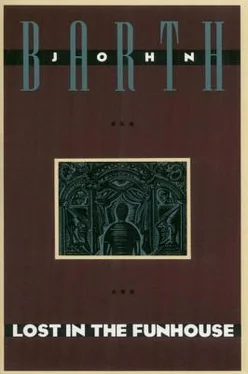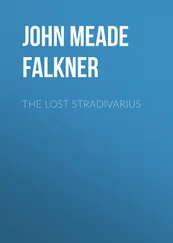John Barth - Lost in the Funhouse
Здесь есть возможность читать онлайн «John Barth - Lost in the Funhouse» весь текст электронной книги совершенно бесплатно (целиком полную версию без сокращений). В некоторых случаях можно слушать аудио, скачать через торрент в формате fb2 и присутствует краткое содержание. Год выпуска: 2014, ISBN: 2014, Издательство: Knopf Doubleday Publishing Group, Жанр: Современная проза, на английском языке. Описание произведения, (предисловие) а так же отзывы посетителей доступны на портале библиотеки ЛибКат.
- Название:Lost in the Funhouse
- Автор:
- Издательство:Knopf Doubleday Publishing Group
- Жанр:
- Год:2014
- ISBN:978-0-8041-5250-1
- Рейтинг книги:3 / 5. Голосов: 1
-
Избранное:Добавить в избранное
- Отзывы:
-
Ваша оценка:
- 60
- 1
- 2
- 3
- 4
- 5
Lost in the Funhouse: краткое содержание, описание и аннотация
Предлагаем к чтению аннотацию, описание, краткое содержание или предисловие (зависит от того, что написал сам автор книги «Lost in the Funhouse»). Если вы не нашли необходимую информацию о книге — напишите в комментариях, мы постараемся отыскать её.
Lost in the Funhouse — читать онлайн бесплатно полную книгу (весь текст) целиком
Ниже представлен текст книги, разбитый по страницам. Система сохранения места последней прочитанной страницы, позволяет с удобством читать онлайн бесплатно книгу «Lost in the Funhouse», без необходимости каждый раз заново искать на чём Вы остановились. Поставьте закладку, и сможете в любой момент перейти на страницу, на которой закончили чтение.
Интервал:
Закладка:
The final possibility is a temporary expedient, to be sure, the self-styled narrator of this so-called story went on to admit, ignoring the hostile impatience of his audience, but what is not, and every sentence completed is a step closer to the end. That is to say, every day gained is a day gone. Matter of viewpoint, I suppose. Go on. I am. Whether anyone’s paying attention or not. The final possibility is to turn ultimacy, exhaustion, paralyzing self-consciousness and the adjective weight of accumulated history.… Go on. Go on. To turn ultimacy against itself to make something new and valid, the essence whereof would be the impossibility of making something new. What a nauseating notion. And pray how does it bear upon the analogy uppermost in everyone’s mind? We’ve gotten this far, haven’t we? Look how far we’ve come together. Can’t we keep on to the end? I think not. Even another sentence is too many. Only if one believes the end to be a long way off; actually it might come at any moment; I’m surprised it hasn’t before now. Nothing does when it’s expected to.
Silence. There’s a fourth possibility, I suppose. Silence. General anesthesia. Self-extinction. Silence.
Historicity and self-awareness, he asseverated, while ineluctable and even greatly to be prized, are always fatal to innocence and spontaneity. Perhaps adjective period Whether in a people, an art, a love affair, on a fourth term added not impossibly to make the third less than ultimate. In the name of suffering humanity cease this harangue. It’s over. And the story? Is there a plot here? What’s all this leading up to?
No climax. There’s the story. Finished? Not quite. Story of our lives. The last word in fiction, in fact. I chose the first-person narrative viewpoint in order to reflect interest from the peculiarities of the technique (such as the normally unbearable self-consciousness, the abstraction, and the blank) to the nature and situation of the narrator and his companion, despite the obvious possibility that the narrator and his companion might be mistaken for the narrator and his companion. Occupational hazard. The technique is advanced, as you see, but the situation of the characters is conventionally dramatic. That being the case, may one of them, or one who may be taken for one of them, make a longish speech in the old-fashioned manner, charged with obsolete emotion? Of course.
I begin calmly, though my voice may rise as I go along. Sometimes it seems as if things could instantly be altogether different and more admirable. The times be damned, one still wants a man vigorous, confident, bold, resourceful, adjective, and adjective. One still wants a woman spirited, spacious of heart, loyal, gentle, adjective, adjective. That man and that woman are as possible as the ones in this miserable story, and a good deal realer. It’s as if they live in some room of our house that we can’t find the door to, though it’s so close we can hear echoes of their voices. Experience has made them wise instead of bitter; knowledge has mellowed instead of souring them; in their forties and fifties, even in their sixties, they’re gayer and stronger and more authentic than they were in their twenties; for the twenty-year-olds they have only affectionate sympathy. So? Why aren’t the couple in this story that man and woman, so easy to imagine? God, but I am surfeited with clever irony! Ill of sickness! Parallel phrase to wrap up series! This last-resort idea, it’s dead in the womb, excuse the figure. A false pregnancy, excuse the figure. God damn me though if that’s entirely my fault. Acknowledge your complicity. As you see, I’m trying to do something about the present mess; hence this story. Adjective in the noun! Don’t lose your composure. You tell me it’s self-defeating to talk about it instead of just up and doing it; but to acknowledge what I’m doing while I’m doing it is exactly the point. Self-defeat implies a victor, and who do you suppose it is, if not blank? That’s the only victory left. Right? Forward! Eyes open.
No. The only way to get out of a mirror-maze is to close your eyes and hold out your hands. And be carried away by a valiant metaphor, I suppose, like a simile.
There’s only one direction to go in. Ugh. We must make something out of nothing. Impossible. Mystics do. Not only turn contradiction into paradox, but employ it, to go on living and working. Don’t bet on it. I’m betting my cliché on it, yours too. What is that supposed to mean? On with the refutation; every denial is another breath, every word brings us closer to the end.
Very well: to write this allegedly ultimate story is a form of artistic fill in the blank, or an artistic form of same, if you like. I don’t. What I mean is, same idea in other terms. The storyteller’s alternatives, as far as I can see, are a series of last words, like an aging actress making one farewell appearance after another, or actual blank. And I mean literally fill in the blank. Is this a test? But the former is contemptible in itself, and the latter will certainly become so when the rest of the world shrugs its shoulders and goes on about its business. Just as people would do if adverbial clause of obvious analogical nature. The fact is, the narrator has narrated himself into a corner, a state of affairs more tsk-tsk than boo-hoo, and because his position is absurd he calls the world absurd. That some writers lack lead in their pencils does not make writing obsolete. At this point they were both smiling despite themselves. At this point they were both flashing hatred despite themselves. Every woman has a blade concealed in the neighborhood of her garters. So disarm her, so to speak, don’t geld yourself. At this point they were both despite themselves. Have we come to the point at last? Not quite. Where there’s life there’s hope.
There’s no hope. This isn’t working. But the alternative is to supply an alternative. That’s no alternative. Unless I make it one. Just try; quit talking about it, quit talking, quit! Never dare a desperate man. Or woman. That’s the one thing that can drive even the first part of a conventional metaphor to the second part of same. Talk, talk, talk. Yes yes, go on, I believe literature’s not likely ever to manage abstraction successfully, like sculpture for example, is that a fact, what a time to bring up that subject, anticlimax, that’s the point, do set forth the exquisite reason. Well, because wood and iron have a native appeal and first-order reality, whereas words are artificial to begin with, invented specifically to represent. Go on, please go on. I’m going. Don’t you dare. Well, well, weld iron rods into abstract patterns, say, and you’ve still got real iron, but arrange words into abstract patterns and you’ve got nonsense. Nonsense is right. For example. On, God damn it; take linear plot, take resolution of conflict, take third direct object, all that business, they may very well be obsolete notions, indeed they are, no doubt untenable at this late date, no doubt at all, but in fact we still lead our lives by clock and calendar, for example, and though the seasons recur our mortal human time does not; we grow old and tired, we think of how things used to be or might have been and how they are now, and in fact, and in fact we get exasperated and desperate and out of expedients and out of words.
Go on. Impossible. I’m going, too late now, one more step and we’re done, you and I. Suspense. The fact is, you’re driving me to it, the fact is that people still lead lives, mean and bleak and brief as they are, briefer than you think, and people have characters and motives that we divine more or less inaccurately from their appearance, speech, behavior, and the rest, you aren’t listening, go on then, what do you think I’m doing, people still fall in love, and out, yes, in and out, and out and in, and they please each other, and hurt each other, isn’t that the truth, and they do these things in more or less conventionally dramatic fashion, unfashionable or not, go on, I’m going, and what goes on between them is still not only the most interesting but the most important thing in the bloody murderous world, pardon the adjectives. And that my dear is what writers have got to find ways to write about in this adjective adjective hour of the ditto ditto same noun as above, or their, that is to say our, accursed self-consciousness will lead them, that is to say us, to here it comes, say it straight out, I’m going to, say it in plain English for once, that’s what I’m leading up to, me and my bloody anticlimactic noun, we’re pushing each other to fill in the blank.
Читать дальшеИнтервал:
Закладка:
Похожие книги на «Lost in the Funhouse»
Представляем Вашему вниманию похожие книги на «Lost in the Funhouse» списком для выбора. Мы отобрали схожую по названию и смыслу литературу в надежде предоставить читателям больше вариантов отыскать новые, интересные, ещё непрочитанные произведения.
Обсуждение, отзывы о книге «Lost in the Funhouse» и просто собственные мнения читателей. Оставьте ваши комментарии, напишите, что Вы думаете о произведении, его смысле или главных героях. Укажите что конкретно понравилось, а что нет, и почему Вы так считаете.












